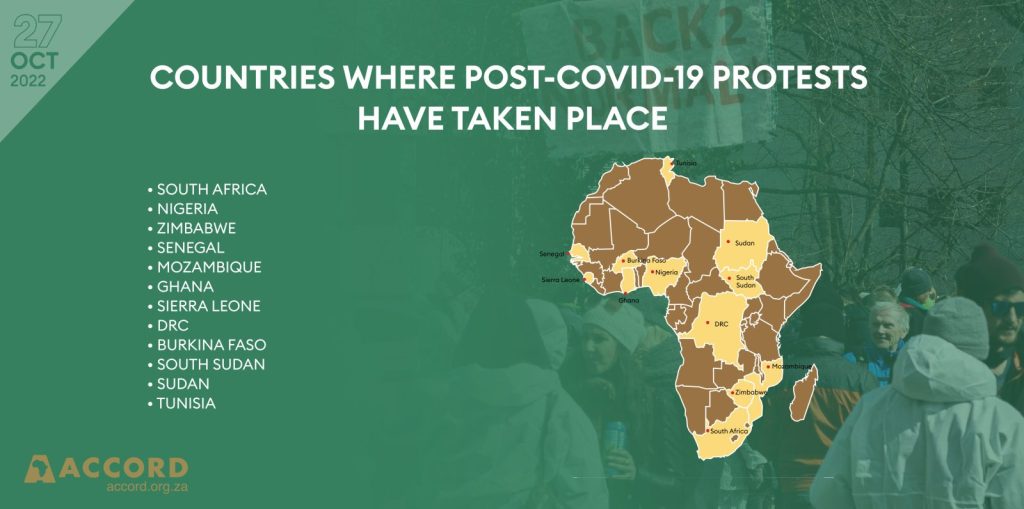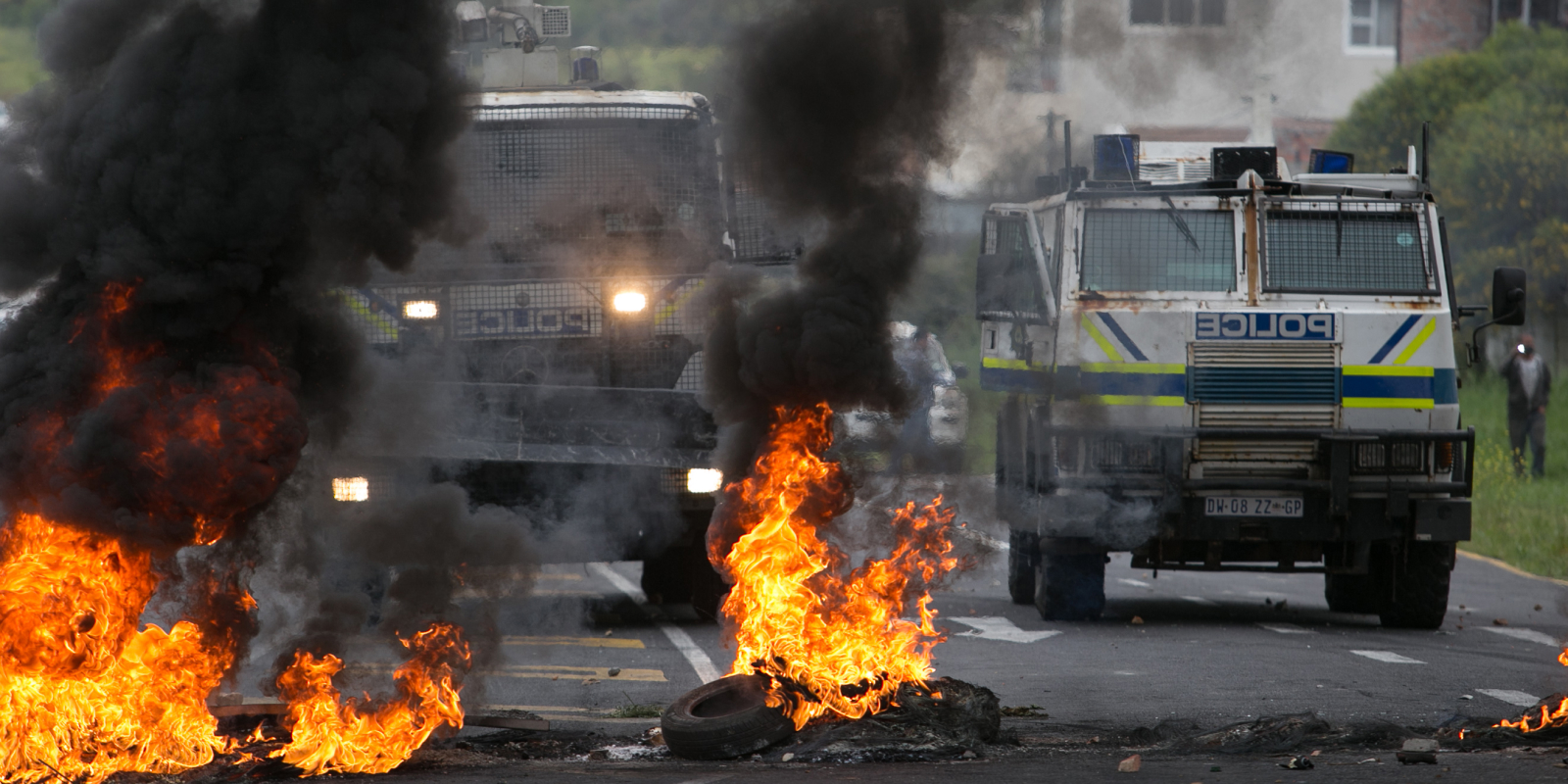Protests over the exorbitant cost of living have become a frequent feature in Africa which, amongst other things, was exacerbated by the COVID-19 pandemic through measures such as lockdowns. Protests in Africa are an expression of a growing legitimacy crisis in African governments and about failed promises, the enrichment of political elites and the undermining of democratic institutions.
There is a growing perception that many African governments are failing to take meaningful, substantive and sustainable measures to improve the standard of living of their citizens
Tweet
It is against this backdrop that there is a growing perception that many African governments are failing to take meaningful, substantive and sustainable measures to improve the standard of living of their citizens. This has propelled citizens to resort to protest action with the intention of articulating their dissatisfaction and grievances related to government failures or inaction. This growing dissatisfaction is equally augmented by growing insecurity on the continent where state security agencies and multilateral institutions have failed to protect civilians from violence. Most African government responses to COVID-19 were relatively swift and to a large degree had acute- though unintended- repercussions which had dire effects on the economy thus straining and compromising people’s livelihoods. Equally so, these responses to either disperse protestors or maintain calm have resulted in the loss of life and destruction of property due to security forces’ interventions where protestors are confronted with brute force.
The COVID-19 pandemic had substantially disrupted and altered African economies and subsequently plunged a significant number of its citizens further into expeditiously desperate levels of poverty. With a considerable number of the population living below the poverty line, the growing dissatisfaction with governments’ action or lack thereof is often expressed through protests over the skyrocketing cost of living which has swept across the continent.
In cases such as Zimbabwe and Nigeria, universities have not been spared the financial hardship where tuition fees have sky-rocketed along with the cost of living thus compromising and denying access to higher education for the greater part of the populations. In Zimbabwe, 16 university students were arrested and later released due to their peaceful demonstrations. In Nigeria, university lecturers have been on strike for at least eight months and have recently suspended the strike as negotiations continue between the state and affected stakeholders.

Recent protests in countries such as Sierra Leone, South Africa, Mozambique, Senegal and Ghana have been triggered by the cost of living crisis. 31 people died during protests in Sierra Leone, including 21 civilians and six police officers. Protests ensued in South Africa over the soaring cost of living, poor service delivery, power and water cuts and unemployment rates in Cape Town and Pretoria that were led by the Congress of South African Trade Unions (COSATU).
Protesting truck drivers in Mozambique blocked roads as they protested against the all-time high diesel and petrol prices as the government introduced a temporary reduction in a fuel levy. At least one person died after a violent altercation broke out between protestors and the police over tensions between the ruling party and opposition party in Senegal. Clashes between the police and hundreds of demonstrators in Ghana ensued as protestors displayed their frustration during an authorised two-day protest over fuel price hikes, a tax on electronic payments and other levies as the country battled rocketing inflation and an economic downturn. The protests were intended to denounce economic hardships. The Ghanaian government has ruled out the prospect of requesting assistance from the International Monetary Fund (IMF) despite warnings of a looming debt crisis. Due to financial hardships, protests have become a knock on effect of bad governance but protests caused by the exorbitant food and fuel prices have not been the only protests that have been the centre of attention in Africa.
Post COVID-19 protests are not limited to financial hardships resulting from the hike in food and fuel prices. They have also been a response to spasms of violence such as that of the Democratic Republic of the Congo (DRC) protestors demanding the eviction of the United Nations Organisation Stabilisation in the Democratic Republic of the Congo (MONUSCO), claiming that the mission failed to stem violence in the country. Several civilians, Congolese police and peacekeepers died in the protests that lasted for many days in recent months. MONUSCO has been in the DRC since 30 November 1999 (it costs approximately $1billion annually) and is one of the UN’s biggest missions in Africa and yet violence persists. Civilians claim that the peacekeeping mission has failed to protect them from militia violence that has wreaked havoc in the region over the years. The recent anti-UN protests have been active since July 2022.
Protestors in Burkina Faso on 30 September 2022 and South Sudan on 21 January 2022, have called for an end to military rule and a return to civilian rule where progressive constitutions can be put into place. Thousands of Sudanese protested against last year’s military coup and demanded a return to civilian rule and an improved standard of living. Approximately 102 people have died as a result of violent crackdown on the weekly protests that have occurred since the coup.
Hundreds of disgruntled protestors took to the streets of Tunis, Tunisia’s capital over food shortages caused by soaring inflation compounded by ongoing political unrest in September 2022. In 2021 Tunisian President, Kais Saied dissolved parliament, a move the opposition viewed as a “coup”. Unrest followed after the government increased the price of cooking gas cylinders by 14% earlier in September 2022. It also hiked the price of fuel four times this year in order to reduce energy subsidies that are in line with IMF conditions to secure a loan to recuperate public finances that were used for subsidies. Police responded by firing tear gas on the protestors with the intention of dispersing the crowd.
On 15 October 2022, the National Salvation Front (a coalition of opposition parties in the Islamist-inspired Ennahdha) organised a protest where thousands of Tunisians took to the streets demanding an end to the power grab by Saied. Another protest was also organised by the Free Destourian Party (PDL) in Tunis. Additionally they called for accountability and solutions to the country’s longstanding economic crisis which was crippled by the corruption by the late dictator Zine El Abidine Ali. The National Salvation Front has declared that they will boycott a December vote which will elect a new parliament that was dissolved by Saied (who introduced a one man rule last year).
The return of civil and political protests that are being initiated in some African countries, and which they continue to experience, deserve equal if not greater consideration by conflict resolution practitioners
Tweet
It is evident that there is an intersectionality of a myriad of issues that compel civilians to take to the streets to air out their grievances against their governments. The impact of the COVID-19 pandemic along with soaring food and fuel prices have exacerbated the ongoing issues that citizens have with their governments. Even if at the turn of the century Africa may have seen a decline in interstate wars, the return of civil and political protests that are being initiated in some African countries, and which they continue to experience, deserve equal if not greater consideration by conflict resolution practitioners.
Zikho Dana is an intern at ACCORD


